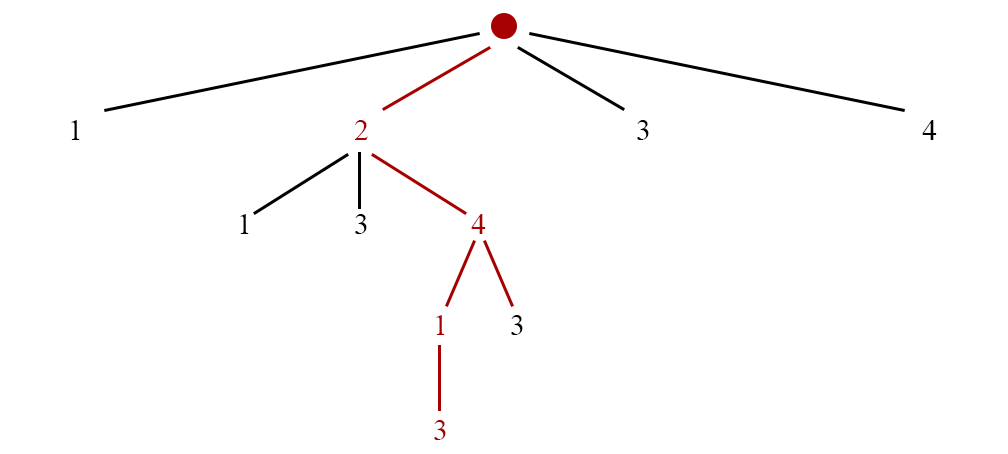Once I worked on a project whose task was to create a utility for the examination. One user creates questions, combines them into a test, establishes some rules such as execution time, how to count points. And the other user simply opens and answers questions. Among other things, the task was to realize the ability to mix the sequence of questions, but so that for a particular user it was the same as when it was first opened.
The task is quite simple and we solved it quickly. And the solution was as follows: We have n questions. From combinatorics, we know that if we have n> 1 elements, by rearranging the elements in places, we can get different sequences of these elements, where the maximum number of different sequences is. So it was decided, we write it means a function, we calculate the factorial there, generate the nth sequence, and generate the number n itself randomly and write it to the database. We send hrenak-hrenak and in production to testers. And everything seems to be normal, but if something unexpected had not happened, this article would not have been.
What happened
And happened . Keeping the factorial value of numbers greater than 20 (actually 13) was a big problem that was not taken into account when writing the code. As a result, if there were more questions, then of course nothing worked. It was necessary to somehow solve the flaw. One option was simply to divide the array, mix the elements in the sub-arrays, and then mix them ourselves. As such, this option is acceptable, but since everyone entrusted me with the fix, I decided to go the other way.
Oh new marvelous way
, — « , ?». , . - n , . , , , , . n , .

. , :
public static int[] generateArray(int n) {
int[] array = new int[n];
for (int i = 0; i < n; i++) {
array[i] = i;
}
return array;
}
, , Java :
int[] arrayCopy = Array.copyOf(mainArray, mainArray.length);
:
public static int[] shuffleArray(int[] array, Random rand) {
int[] shuffledArray = new int[array.length];
for (int i = 0; i < array.length; i++) {
int origIndex = rand.nextInt(array.length - i);
shuffledArray[i] = array[origIndex];
int temp = array[origIndex];
array[origIndex] = array[array.length - i - 1];
array[array.length - i - 1] = temp;
}
return shuffledArray;
}
, , seed . , , , - :
public static void main(String[] args) {
int[] mainArray = generateArray(30);
int[] arrayCopy = Arrays.copyOf(mainArray, mainArray.length);
Random rand = new Random(419L);
int[] shuffledArray = shuffleArray(arrayCopy, rand);
for (int i = 0; i < shuffledArray.length; i++) {
System.out.print(shuffledArray[i] + " ");
}
System.out.println();
}
, . , :
import java.util.Random;
import java.util.Arrays;
public class Shuffle {
public static void main(String[] args) {
int[] mainArray = generateArray(30);
int[] arrayCopy = Arrays.copyOf(mainArray, mainArray.length);
Random rand = new Random(419L);
int[] shuffledArray = shuffleArray(arrayCopy, rand);
for (int i = 0; i < shuffledArray.length; i++) {
System.out.print(shuffledArray[i] + " ");
}
System.out.println();
}
public static int[] generateArray(int n) {
int[] array = new int[n];
for (int i = 0; i < n; i++) {
array[i] = i;
}
return array;
}
public static int[] shuffleArray(int[] array, Random rand) {
int[] shuffledArray = new int[array.length];
for (int i = 0; i < array.length; i++) {
int origIndex = rand.nextInt(array.length - i);
shuffledArray[i] = array[origIndex];
int temp = array[origIndex];
array[origIndex] = array[array.length - i - 1];
array[array.length - i - 1] = temp;
}
return shuffledArray;
}
}
, , . , ( ), n- . , :
public static int[] subArrayElem(int nth, int elemNumber) {
int[] sequence = new int[elemNumber];
for (int i = 1; i <= elemNumber; i++) {
sequence[elemNumber - i] = nth % i;
nth /= i;
}
return sequence;
}
, , . -, . , :
public static int[] shuffleArray(int[] array, int nth) {
int[] shuffledArray = new int[array.length];
int[] sequence = subArrayElem(nth, array.length);
for (int i = 0; i < array.length; i++) {
int origIndex = sequence[i];
shuffledArray[i] = array[origIndex];
shiftArray(array, origIndex);
}
return shuffledArray;
}
public static void shiftArray(int[] array, int index) {
for (int i = index; i < array.length - 1; i++) {
array[i] = array[i + 1];
}
}
, , .
, . BigInteger, . - , . - . , , - , . , , ? .
UPD:, Java, java.util.Collections.shuffle() . Java .